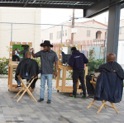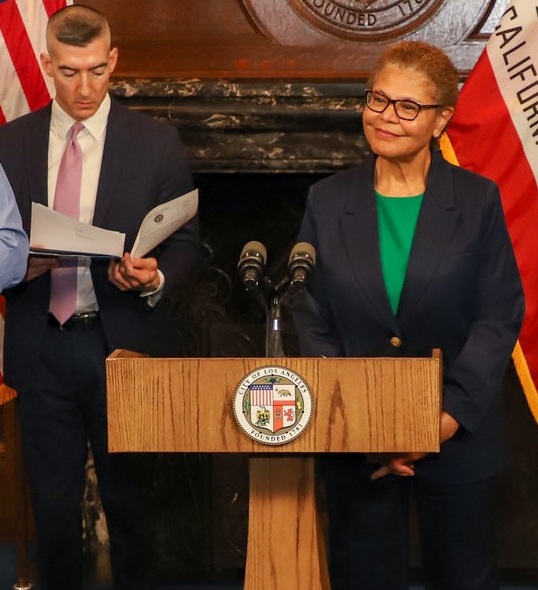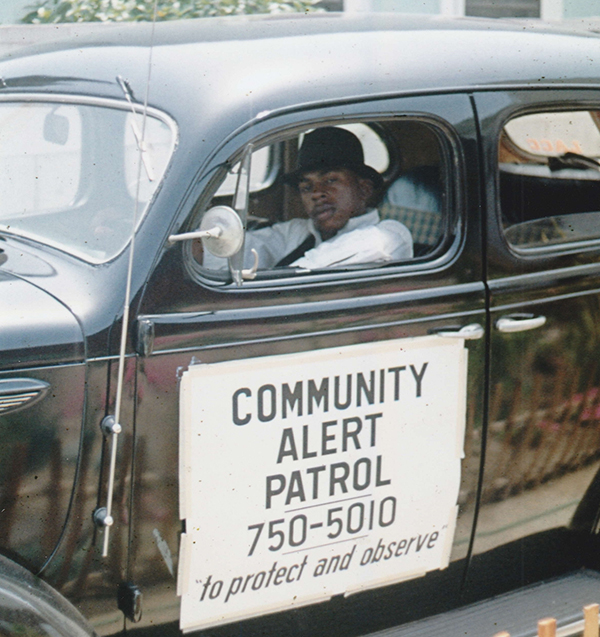Community Coalition event allows men to express themselves
By Shirley Hawkins
Contributing Writer
SOUTH LOS ANGELES — When it comes to expressing opinions, the barbershop has always provided a safe haven for Black men. Whether it’s chatting about the latest news, sounding off about sports or politics, or talking about issues that affect Black males, the barbershop remains a familiar place where Black men can share their thoughts.
On Oct. 23, the Community Coalition held a meet-and-greet titled “The Barbershop Lounge: A Conversation Amongst Black Men” to discuss the current state of Black men in South Los Angeles.
Originally founded by U.S. Rep Karen Bass in 1990, the Community Coalition has worked to address the social and economic conditions that affect South Los Angeles. Over the years, the coalition has pushed back against addiction, crime, violence and poverty through thousands of policy efforts.
“We wanted to get more Black men to join the Community Coalition, which provides guidance on how community members can influence and change public policy,” said Corey Matthews, the chief operating officer of the coalition.
Dozens of Black men attended the event that was held in coalition’s newly remodeled parking lot. A colorful mural of community leaders painted by local artist Michael Massenberg served as the backdrop for the event.
Attendees shared their opinions on a public microphone, danced and swayed to funky beats spun by a disc jockey, received fresh haircuts from a skilled row of barbers, played video games and munched on complimentary tacos.
According to statistics compiled by the Community Coalition, a number of Black men have been hit since the start of the pandemic. During its 2021 Community Wide Assessment, the Community Coalition compiled data after interviewing more than 200 Black male residents in South L.A.
Some of the statistics compiled from the survey included:
• Unemployment rates rose from 13% before the pandemic to 25% during the pandemic.
• Nearly one-third of men surveyed feel that they have been either racially profiled or harassed by the police.
• Mental and financial health were their greatest sources of stress.
• And talking with friends and family (by phone, text or video) was utilized by Black men as their highest coping mechanism for stress.
“A lot of Black men don’t feel safe in their own neighborhoods due to gang violence and the police presence in the community,” said longtime coalition member Damien Valentine, who noticed that police presence increases in the area on weekends. “If they arrest you, then you miss your social activities because they lock you up on a Friday and you can’t get out until Monday. When Black men come to these events like the barbershop event, it lets them know that the Community Coalition is a safe space to come to.”
Asked about the issues he feels are currently impacting Black men, David Turner, a researcher at UCLA and founder of the youth group Brothers, Sons and Selves, said: “I feel what is really affecting us is the economy. A lot of Black men are the first ones pushed out of the labor force. It’s not just connected to COVID. Jobs are shifting to skills that are supporting the gig economy.
“The second issue I feel that is affecting Black men is the criminal justice system,” Turner said. “Once a brother’s name is registered in the law enforcement database, that record will follow a Black man making it hard for him to get employment or to even rent an apartment.”
Charles Taylor said that he was concerned about redistricting.
“I was just at a community meeting and we discussed the issue of redistricting that is trying to reduce our voting power,” he said.
Marvelous, a veteran barber for 30 years who was busy cutting hair at his portable barber booth, voiced his concern about gun violence that continues to plague the city.
“Los Angeles has become more dangerous,” he said. “A few years ago, I was cutting hair at a barbershop on Crenshaw Boulevard when a stray bullet whizzed by and grazed my station.
“My mom always told me that if there’s trouble where you’re at, you gotta move.” Marvelous followed his mother’s advice, packed his bags and moved to Murietta.
Justin Walker, who works for the Ivri Group real estate company and the Fit Body Boot Camp, said that he was concerned about destructive influences in the community that might lead Black youth astray and felt it was important to point youth in the right direction.
“We’ve got to start teaching our young people what’s right and what’s wrong in life,” he said.
Walker said he was aware of increasing gentrification happening in the city and the importance of home ownership. “I’m involved in real estate and I’m trying to get Black kids to become homeowners when they become adults in order to increase Black home ownership in Los Angeles,” he said.
“I feel that the most pressing issue affecting Black men is gun violence and gang activity,” Walker added. “Ever since I was a little kid, I was around a lot of gang bangers. I’ve watched the fathers, called original gangsters, initiate their sons into gangs. Family gang initiations have been going on since before my time.”
Dennis Washington, a grandfather who said he donates his time to cutting hair for the homeless, said his life was impacted by gun violence.
“I had a grandson who was recently killed not far from here,” he said sadly.
Postal worker Leeon Stewart, 29, said there were myriad concerns affecting Black men.
“We fight against the police, Black folks are losing homes, and mental health issues are increasing,” he said. “I worked at a mental health facility and the patients ranged from age 12 to 60. Most of the people in the facility were not on drugs. They were undergoing severe depression and anxiety.
“Some of them had lost their homes or jobs during the pandemic. I feel that the pandemic made it harder for a lot of people — including Black people — to cope.”
Stewart said his own family had been touched by the scourge of the pandemic. “I lost my father Lee to COVID,” he said. “It was horrible. You know, when Black men aren’t feeling well, they just try to stick it out. My dad would lie on the couch but he had trouble breathing.
“He was admitted to Harbor-UCLA hospital in Torrance around April 17, but he said he was mistreated in the hospital. The male nurse told him, ‘I’m not doing anything for you. You have to care for yourself.’ I was at the hospital during his last days but my father couldn’t talk because he was on a ventilator. I was there when my dad took his last breaths. I feel that many Black people are being mistreated in the hospital, especially during the time of COVID.”
At the end of the event, Matthews, the head of Community Coalition, tried to sum up what he heard.
“I feel that Black men have unmet physical and mental health needs,” Matthews said. “There also is the issue of the over policing and the criminalization of Black men. One of the other issues Black men face is a lack of holistic support because we have a culture of incarceration instead of a culture of care.”
He also said that he received a lot of positive feedback from the attendees.
“I think the event was fulfilling, inspiring and memorable,” he said. “It got a very good reception among the Black men who showed up and we hope to have the event again soon.”











